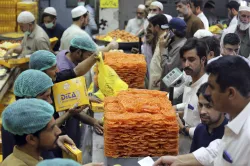'Prices change faster than the dates': Pakistanis dismayed by soaring prices ahead of Ramadan I VIDEO
Pakistan has been reeling under massive economic woes, with the inflation rate hitting a peak of 38 per cent. This has affected the shopping for Ramadan, where people complain of difficulties in purchasing even simple clothes for their kids.

Lahore: With the holy month of Ramadan coming to an end this week, shopping malls and traditional markets across Pakistan are bustling with customers ahead of the Muslim festival Eid al Fitr.
But this year, both shoppers and vendors say that inflation is dampening enthusiasm for purchases. The last week of Ramadan normally sees a shopping frenzy with families thronging to markets soon after "iftar" (breaking of fast at sunset) in search of new clothes, jewellery and shoes that are usually considered Eid essentials for the three days of the festival in Pakistan.

"Prices are changing faster than the dates"
Customers and shopkeepers at major outdoor markets in the cities of Karachi and Lahore said that prices of goods appear to have doubled since around the same time last year. "Prices have increased more than four or five times since last year. People’s buying power can be gauged from the fact that the person who could buy four items last year, is only buying one this year. And the person who has children is only buying stuff for his kids, he is doing no shopping for himself. You can say that prices are changing faster than the dates. Dates change slowly. That’s how bad the situation is," said Md Fawad.
"I am a shop owner myself. Yet I have only done shopping for my children. I have bought nothing for myself. You can judge the situation from that. If we as shop owners cannot do proper Eid shopping, how can the poor, middle-class man do so?" he added.
"We have to buy something for the kids"
Eid al Fitr, which marks the end of Ramadan, is expected to fall on April 10 in Pakistan this year, though it may be delayed by a day due to the visibility of the moon. "Inflation is very much there. There is no doubt that things are too costly. But obviously, we have to buy something for the kids. No getting away from that," said Ahmed Moghul, a Lahore resident.
Pakistan has faced significant inflation challenges, hitting a peak of 38% last May, partly influenced by tax measures to meet International Monetary Fund (IMF) requirements. It has to meet IMF conditions including revising its budget and raising interest rates, as well as generating revenue through more taxes and hiking electricity and gas prices.
(With inputs from agency)
Also Read: WATCH: Festival of colour in streets of Karachi as Pakistani Hindus celebrate Holi
